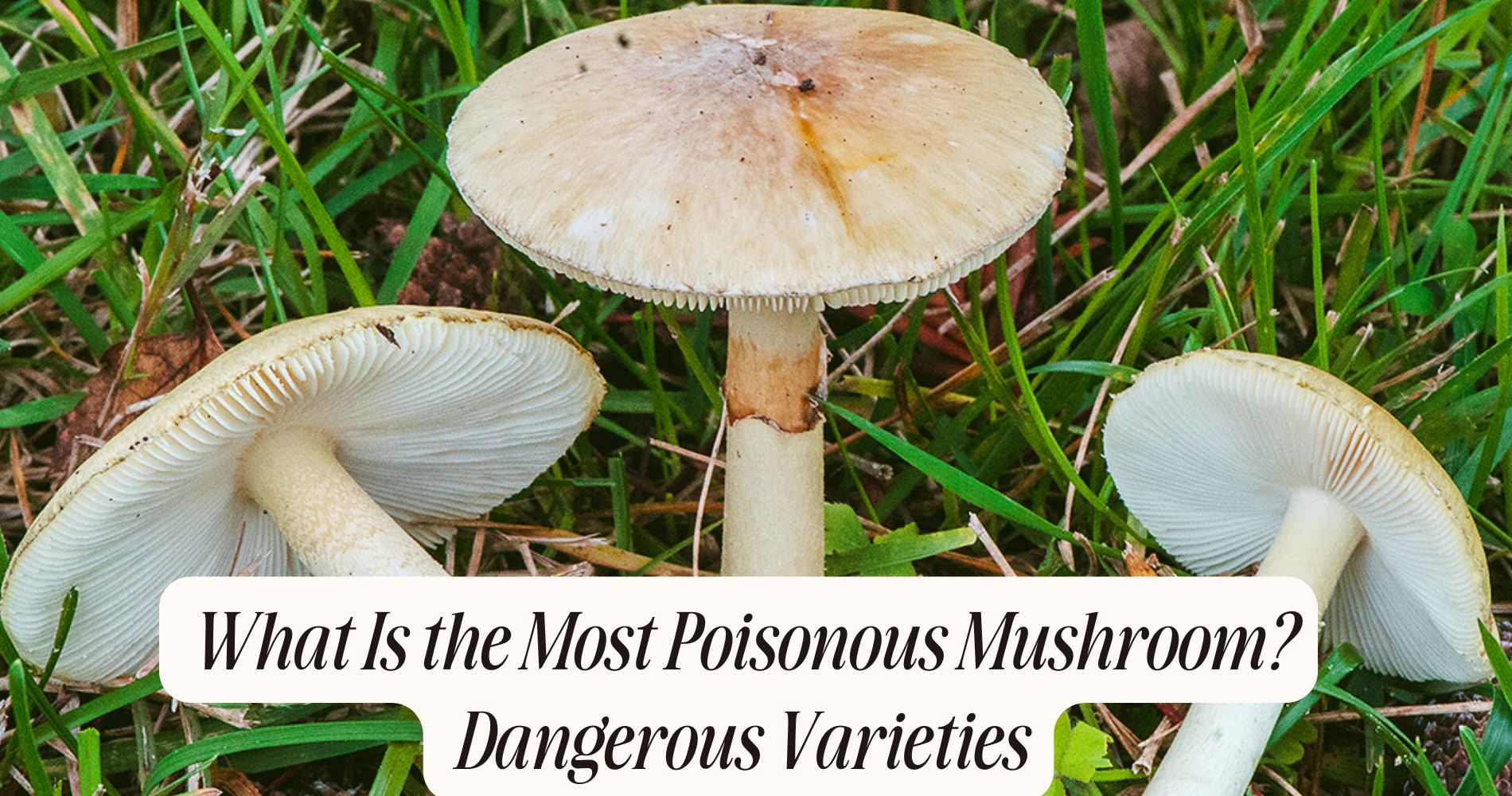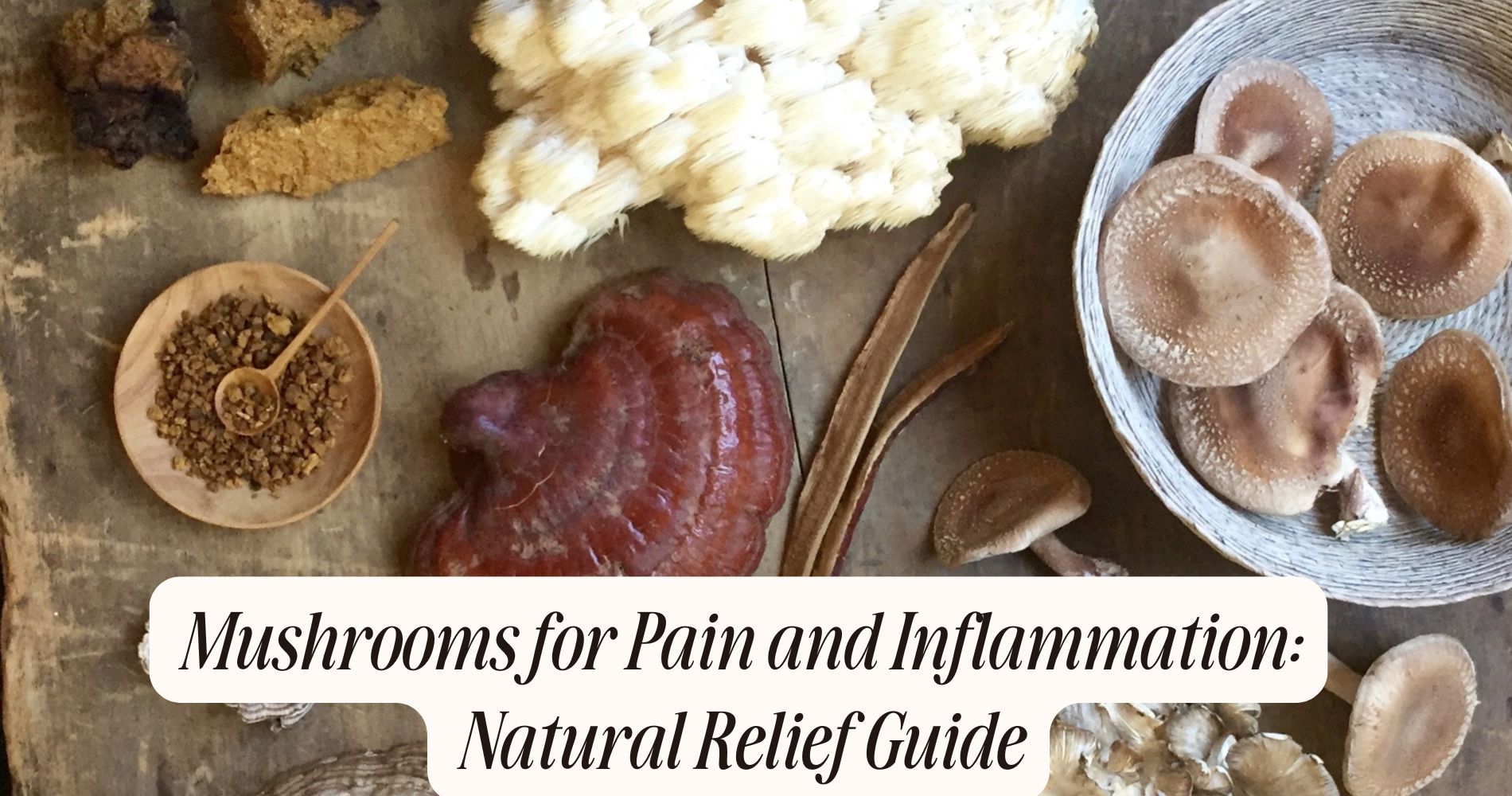
Are Mushrooms Good for Diabetes? Expert Answer
Mushrooms are great for diabetes management because they're low in calories and carbohydrates. They're packed with fiber, which helps regulate blood sugar levels and enhance insulin sensitivity. Varieties like shiitake and maitake also contain antioxidants and essential nutrients that support overall health. You can easily incorporate them into your meals by sautéing, grilling, or adding them to soups. While they're beneficial, it's wise to consult with your healthcare provider, especially if you're on medication. If you're curious about the specific types of mushrooms to try and how to use them, you'll find more insights ahead.
Nutritional Profile of Mushrooms
When it comes to understanding the nutritional profile of mushrooms, their remarkable versatility stands out. You'll find that different mushroom varieties offer a range of nutrients, making them a fantastic addition to your meals. For instance, shiitake mushrooms are rich in B vitamins, while portobellos provide a good source of potassium.

Mushrooms are low in calories and high in fiber, which can help you feel full without overindulging. This aspect makes them an excellent choice for various culinary uses. You can sauté them, roast them, or even toss them into soups and salads. Their umami flavor enhances dishes, making them an appealing option for both meat-lovers and vegetarians alike.
Additionally, mushrooms are packed with antioxidants and essential minerals, contributing to a balanced diet. You can easily incorporate them into breakfast omelets, stir-fries, or pasta dishes, adding not only nutritional value but also a savory depth to your meal.
Benefits of Mushrooms for Diabetes
Mushrooms pack a powerful punch when it comes to managing diabetes.
Their nutrient density and high fiber content can help regulate blood sugar levels, making them a smart choice for your meals.
Plus, their antioxidant properties may offer additional benefits that support your overall health.
Nutrient Density and Fiber
Enjoying the nutrient density of mushrooms can be a game changer for managing diabetes. These amazing fungi are low in calories and packed with essential nutrients, making them an excellent addition to your diet. With various mushroom varieties, like shiitake, portobello, and button mushrooms, you can easily incorporate them into your meals.
Mushrooms are rich in vitamins, minerals, and antioxidants, which can support overall health. They contain important nutrients like B vitamins, selenium, and potassium, all of which play roles in maintaining energy levels and supporting metabolic function.
Plus, mushrooms are a great source of dietary fiber, which is beneficial for digestive health and can help you feel fuller longer.
Following dietary recommendations for diabetes management often emphasizes whole foods and high-fiber options. By including mushrooms in your meals, you're not only enhancing flavor but also boosting your nutrient intake without adding excessive carbs or calories.
Blood Sugar Regulation
Regularly incorporating mushrooms into your diet can considerably aid in blood sugar regulation for those managing diabetes. These versatile fungi are low in calories and carbohydrates, making them an excellent choice for maintaining healthy blood sugar levels. The unique compounds found in mushrooms, such as polysaccharides, can enhance insulin sensitivity, which is essential for effective blood sugar management.

Mushrooms also contain essential nutrients like potassium and magnesium, which play a role in glucose metabolism. By improving insulin sensitivity, mushrooms help your body utilize glucose more effectively, preventing spikes in blood sugar levels after meals. This can lead to better overall control of your diabetes and reduce the risk of complications.
Moreover, the fiber content in mushrooms contributes to a feeling of fullness, which can help you avoid overeating and maintain a balanced diet. By regularly adding mushrooms to your meals, you can enjoy their numerous health benefits while supporting your efforts to manage diabetes.
Antioxidant Properties and Benefits
Incorporating mushrooms into your meals not only supports blood sugar regulation but also offers powerful antioxidant properties that can benefit those with diabetes. These fungi contain various bioactive compounds that activate antioxidant mechanisms in your body, helping to combat oxidative stress and inflammation, which are common concerns for people with diabetes.
Oxidative stress can lead to complications such as heart disease, kidney damage, and nerve issues. By adding mushrooms to your diet, you're not just enhancing flavor; you're also working towards reducing the health implications associated with diabetes.
Varieties like shiitake, maitake, and reishi are particularly rich in antioxidants, which can help protect your cells from damage.
Furthermore, mushrooms are low in calories and high in fiber, making them an excellent choice for maintaining a healthy weight, which is vital for blood sugar management.
Impact on Blood Sugar Levels
How do mushrooms influence blood sugar levels? Including mushrooms in your diet can positively affect your blood sugar response. These fungi have a low glycemic impact, meaning they cause minimal spikes in your blood sugar levels compared to other carbohydrate sources. This is beneficial for anyone managing diabetes, as stable blood sugar levels are vital for overall health.
Mushrooms are also rich in fiber, which helps slow down the absorption of sugars in your bloodstream. This slow absorption can lead to a more gradual increase in blood sugar, preventing the sharp spikes that can occur after consuming high-glycemic foods.
Additionally, some studies suggest that certain compounds in mushrooms may enhance insulin sensitivity, further supporting better blood sugar control.
When you choose mushrooms over higher-glycemic options, you're not only making a smart choice for your meal but also for your long-term health. Incorporating mushrooms into various dishes, from stir-fries to salads, can be an easy way to enjoy their benefits.
Types of Mushrooms to Consider
Exploring the diverse world of mushrooms can lead to delicious and healthful choices for your diet, especially when managing diabetes. Several edible varieties aren't only tasty but also packed with nutrients that can benefit your health.
For instance, shiitake and maitake mushrooms are popular options known for their rich flavor and potential blood sugar-regulating properties.
You might also want to take into account oyster mushrooms, which are low in calories and high in fiber, making them a great addition to your meals.

Portobello mushrooms are another excellent choice, providing a hearty texture while being low in carbohydrates.
In addition to these edible varieties, medicinal mushrooms like reishi and chaga have gained attention for their health benefits. These mushrooms can support your immune system and may help improve insulin sensitivity.
Including a mix of these mushrooms in your diet can enhance not only your meals but also your overall well-being.
How to Incorporate Mushrooms in Diet
Incorporating mushrooms into your diet can be both simple and delicious.
You can experiment with various cooking methods, like sautéing or grilling, to bring out their unique flavors.
Plus, trying out different mushroom recipes can make your meals more exciting and nutritious.
Cooking Methods for Mushrooms
While mushrooms can elevate both the flavor and nutritional value of your meals, there are various cooking methods that make it easy to include them in your diet. One popular method is sautéing. You can use sautéing techniques to quickly cook mushrooms in a bit of oil or butter, allowing their natural flavors to shine.
Just remember to slice them evenly for consistent cooking and toss them in a hot pan for a few minutes until they're tender.
Another great option is grilling. Grilling methods can add a smoky flavor that complements the earthiness of mushrooms. You can marinate whole portobello caps or skewered button mushrooms in your favorite seasoning, then grill them until they're juicy and slightly charred.
You might also consider roasting mushrooms in the oven, which enhances their sweetness and texture. Simply toss them with olive oil, salt, and pepper, then roast at high heat until golden brown.
These methods not only make mushrooms delicious but also help retain their nutrients, making it easier for you to enjoy their health benefits regularly.
Mushroom Recipe Ideas
Mushrooms can easily transform your meals, adding flavor and nutrition without overwhelming your diet. One simple way to incorporate mushrooms is through a vibrant mushroom stir fry.
Just sauté your favorite vegetables like bell peppers, broccoli, and carrots with sliced mushrooms in a bit of olive oil. Add soy sauce or a splash of balsamic vinegar for extra taste. This dish is quick, satisfying, and perfect for a busy weeknight.
Another delicious option is stuffed mushrooms. You can hollow out large mushroom caps and fill them with a mixture of cream cheese, garlic, and herbs.
For a healthier twist, consider adding spinach or diced tomatoes. Bake them until golden and bubbly for a delightful appetizer or side dish.
You can also toss sliced mushrooms into salads or omelets for added texture and nutrients.
Don't forget about blending them into soups or sauces for a rich, umami flavor. With these easy recipes, you'll find mushrooms not only enhance your meals but also fit seamlessly into your diabetes-friendly diet.
Cooking Methods for Maximum Benefits
To access the full health benefits of mushrooms, choosing the right cooking methods is essential.
Stir frying benefits include quick cooking at high heat, which helps retain the mushrooms' nutrients and flavor. You can toss your mushrooms in a hot pan with a small amount of healthy oil and your favorite vegetables. This method allows you to enjoy a delicious, nutrient-packed dish without losing essential vitamins.
On the other hand, roasting techniques can enhance the natural umami flavor of mushrooms. By spreading them on a baking sheet and roasting at a high temperature, you're able to achieve a crispy texture while concentrating their flavors.

Roasting also makes it easier to incorporate mushrooms into various dishes, from salads to grain bowls.
Whichever method you choose, aim to keep the cooking time short to preserve nutrient density. Avoid overcooking, as this can lead to nutrient loss.
By using these cooking methods, you'll maximize the health benefits of mushrooms while enjoying their rich taste, making them a fantastic addition to your diabetes-friendly meals.
Potential Risks and Considerations
When incorporating mushrooms into your diet, it's important to be aware of potential risks and considerations. While mushrooms offer various health benefits, including their potential to improve insulin sensitivity, you need to keep some factors in mind.
First, consider the possibility of mushroom allergies. Some individuals may experience allergic reactions, which can range from mild symptoms like itching and hives to more severe reactions. If you're trying mushrooms for the first time, start with a small amount and monitor your body's response.
Next, be cautious about the types of mushrooms you consume. Some wild mushrooms can be toxic, and even edible varieties may cause gastrointestinal discomfort in certain people. Always opt for mushrooms from reputable sources, ensuring they're safe and properly prepared.
Lastly, if you're on medication for diabetes, consult your healthcare provider before adding mushrooms to your diet. While they can enhance insulin sensitivity, they may interact with your medications or affect your blood sugar levels in unexpected ways.
Expert Opinions on Mushroom Consumption
Many health experts advocate for the inclusion of mushrooms in a balanced diet, especially for those managing diabetes. They emphasize the nutritional benefits of various mushroom varieties, which can enhance your meals without adding excessive calories or carbohydrates. For instance, shiitake and maitake mushrooms are praised not only for their flavor but also for their potential to help regulate blood sugar levels.
Experts highlight that mushrooms are low in fat and rich in fiber, making them an excellent choice for maintaining a healthy weight—an important factor in diabetes management. Their unique compounds, like beta-glucans, may even improve insulin sensitivity.
When considering mushrooms, it's crucial to align your choices with your dietary preferences. Whether you're vegan, vegetarian, or following a low-carb diet, there's a mushroom variety that can fit seamlessly into your meals.
Incorporating them into soups, salads, or stir-fries is an easy way to boost nutrition.
Real-Life Success Stories
Inspiring stories of individuals who've successfully integrated mushrooms into their diabetes management highlight the potential benefits of this versatile food. Many people, like Sarah, have shared personal testimonies about how adding mushrooms to their diet helped stabilize their blood sugar levels.
Sarah replaced traditional carbs with sautéed mushrooms in her meals, and she noticed a significant improvement in her energy and glucose readings.
Similarly, James debunked some mushroom myths that suggested mushrooms could spike insulin levels. He found that by incorporating a variety of mushroom types—like shiitake and portobello—into his meals, he not only enjoyed diverse flavors but also improved his overall health.

His blood sugar remained consistent, even during challenging times.
These real-life success stories emphasize that mushrooms aren't just a trendy food; they can play an important role in diabetes management. By listening to these personal testimonies, you might feel inspired to explore how mushrooms could benefit your own journey.
Whether you're sautéing, grilling, or roasting, mushrooms can be a delicious and healthy addition to your plate, helping you take control of your diabetes effectively.
Frequently Asked Questions
Can Mushrooms Interact With Diabetes Medications?
Mushrooms can enhance diabetes management by offering various health benefits. While they generally don't interact negatively with diabetes medications, it's wise to consult your healthcare provider to guarantee they fit well with your treatment plan.
Are There Any Specific Mushroom Species to Avoid?
When considering mushroom types, it's important to avoid toxic varieties like Amanita. Most edible mushrooms offer health benefits, but always make sure you're choosing safe options to enjoy their positive effects without any risks.
How Often Should Diabetics Consume Mushrooms?
You should aim to include mushrooms in your diet several times a week. Their nutritional benefits are maximized through various cooking methods, like sautéing or grilling, enhancing flavor while supporting your overall health.
Do Mushrooms Have Any Side Effects for Diabetics?
Mushrooms generally don't have side effects for diabetics, but it's wise to monitor your blood sugar after consuming them. Their mushroom nutrition can support your health, but individual responses may vary, so stay attentive.
Can Dried Mushrooms Be as Beneficial as Fresh Ones?
Dried mushrooms can be just as beneficial as fresh ones. While there's a nutritional comparison to evaluate, their benefits, like concentrated nutrients and longer shelf life, make them a great option for your diet.
Conclusion
Incorporating mushrooms into your diet can be a smart choice if you're managing diabetes. Their low calorie count, high fiber content, and unique nutrients may help support blood sugar control. Experiment with different types and cooking methods to find what you enjoy most. Just keep in mind any potential allergies or interactions with medications. By making mushrooms a regular part of your meals, you could enhance your overall health while enjoying delicious flavors.



